Businesswoman Challenges Incumbent

Peter Abbate, who was first elected in 1986, will face Republican challenger Lucretia Regina-Potter.
Abbate chairs the Assembly's Committee on Governmental Employees. At a recent forum, Abbate boasted passing of about 225 bills through bipartisan efforts. He has spearheaded legislation requiring that school buses keep their lights on when transporting children, and reforming the city's commercial real estate incentive program.
His challenger, Regina-Potter, is the general manager and designer of Bari Tile and Ceramics in Brooklyn. She is a member of the Brooklyn Chamber of Commerce and the Brooklyn Executive Business Women Association. Part of her agenda is to ensure small businesses can weather the current economic crisis. She also is the Republican district leader for the area.
Abbate raised about $20,650 in the weeks leading up to the 32 Day Pre-General reporting deadline and closed out the period with almost $536,000 on hand, vastly overpowering Regina-Potter in the fundraising department. For the same period, she collected $3,005 in contributions and ended with $3,591 on hand.
The 49th district includes Dyker Heights, Bath Beach, Bensonhurst and Borough Park.
Â
More than $1 Million for an Easy Race
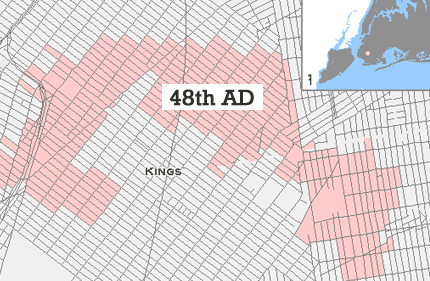
Dov Hikind, who first joined the Assembly in 1982, has both the Democratic and Republican party lines but still faces an opponent: Conservative Herbert Ryan next week.
Hikind considers himself an outspoken advocate for battling discrimination, prejudice and anti-Semitism. A decade ago, he was accused of taking thousands of dollars from local nonprofits but was acquitted of all charges. Though generally considered a Democrat, he recently endorsed John McCain for president.
Ryan, a conservative, has run for several offices before, including state Assembly in 2004 and 2006.
In the filing period leading up to the 32 Day Pre General report, Hikind had raised $3,000 but despite the apparent weakness of his opposition, he had more than $1.2 million on hand for his campaign. Ryan showed no contributions.
The district encompasses Borough Park, Dyker Heights and sections of Flatbush.
Â
Challenger's Campaign Fades
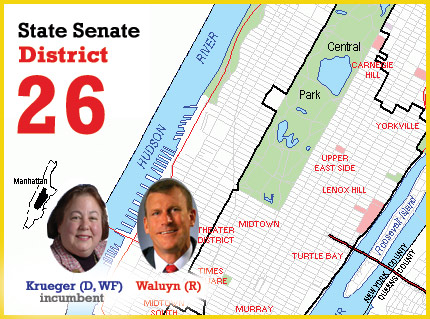
Democratic State Sen. Liz Krueger has faced some tough battles against Republican opponents in this district on Manhattan's Eastside. She narrowly lost to Republican incumbent Sen. Roy Goodman the first time she ran for the seat in 2000 and won a close contest for the post in February 2002.
The district was represented by a Republican for 30 years before Krueger took office, and still has a high number of Republicans -- about 25 percent -- compared to the rest of Manhattan.
Krueger did not face competitive elections in 2004 or 2006, but for a while it looked as though Republicans might mount a strong campaign this year in the person of Timothy Brown. A former firefighter, he was at the World Trade Center on Sept. 11, 2001, and walked out of the North Tower just five minutes before it collapsed. The New York Post story on his candidacy bore the headline, "9/11 Hero Joins State Senate Race." After the attacks, Brown, a leader in emergency response efforts, developed a relationship with former Mayor Rudolph Giuliani and worked on GiulianiĂs campaign. Many of BrownĂs campaign donations came from former Giuliani staffers and fundraisers, and he reportedly received strategic advice from GiulianiĂs former chief of staff, Tony Carbonetti.
Brown also received $50,000 from the State Senate Republican Campaign Committee, a high amount considering he is a challenging an incumbent in his first run for office. The committee, until this summer, was largely run by other former Giuliani staffers like Matthew Mahoney. But then Mahoney, a former senior advisor for GiulianiĂs presidential campaign, was demoted and other Giuliani staffers quit their campaign committee posts after the shake-up. Press accounts said some state Republicans suspected Mahoney was more interested in promoting Giuliani for governor than helping the GOP hold on to its edge in the Senate.
Whether or not the committee shake-up is an indicator, Brown's campaign has been relatively quiet recently. Krueger said of Brown, "If he's waiting to come on strong at the end, he's pushing it a little close to the deadline for himself." The New York Press, in endorsing Krueger, called Brown "a challenger who appears to be just a name on a ballot." Brown's campaign did not respond to requests for an interview.
Krueger, who worked on poverty issues before her election, has risen in the Democratic leadership and is seen as a strong proponent of efforts to reform state government. She has also been active on housing and health care.
In the period covered by the 32 Day Pre-General campaign report, Kruger raised $133,195 in contributions, ending the period with $342,469 on hand. Brown raised $2,230 and had a total of $10,928.
Â
Guide for the Last Minute Voter
To find out who won and who lost, go to Gotham Gazette's Election Results page.
The endless campaign -- the one which had people in Iowa choosing their presidential nominees 10 months ago -- will finally come to an end on Nov. 4.
When it all started, many pundits saw New Yorkers -- Sen. Hillary Clinton and former Mayor Rudolph Giuliani -- as odds-on favorites to be their respective parties' presidential nominees. And if either of them faltered, Mayor Michael Bloomberg stood waiting in the wings.
Now it's almost Election Day, and Clinton is rallying Floridians for Barack Obama, Giuliani is making robocalls for John McCain, and Bloomberg has just persuaded the City Council to override the wishes of the voters and give him the chance to run for another term.
Once again New York has reverted to its usual status in presidential campaigns -- prized for its money but with its votes, like those of California, Texas and Illinois, taken pretty much for granted. New York State has gone Democratic in every presidential election since 1984, often by wide margins.
Millions of New Yorkers will make their presidential preferences known on Nov. 4. Then they can look down the ballots to a variety of other contests, including in many areas, an election for the local state senator. How New Yorkers vote in those elections will determine perhaps the biggest cliffhanger in state politics this year:
Will the Democrats wrest the State Senate from the Republicans, who have controlled it for 40 years?
Congress
Neither of New York's senators is up for reelection this year, but as always in even-numbered years, all the members of Congress, including the 13 from New York, must face the voters in 2008. All the incumbents have opponents but only one race is widely viewed as even remotely competitive.
That one involves the seat now held by the city's only Republican U.S. representative, Vito Fossella, who announced he would not seek reelection after his arrest for drunk driving in Virginia last spring lead to the disclosure that the married politician had a second family in the Washington, D.C. suburbs.
The general election contest in this district, which has long been represented by Republicans, pits Democratic City Councilmember Michael McMahon against Republican Robert Straniere, a former member of the State Assembly, who has attracted the ire of many of his fellow party members. (For our coverage of the primary, including information on McMahon and Straniere and where they stand on issues, click here.)
The State Senate
It has long been a truism of New York politics that the Democrats control the Assembly, the Republicans control the Senate, and the governorship goes back and forth. But recent years have seen an erosion of Republican support in New York. Both the state's U.S. senators and the governor are Democrats, and the party has steadily picked up strength in the state's congressional delegation, which now has 23 Democrats and six Republicans.
Registered Democrats in the state outnumber Republicans by 5.5 million to 3.2 million, capturing the edge even in longtime GOP strongholds such as Nassau and Dutchess counties. (Some 2.4 million New Yorkers are not registered with either party.)
As the party's strength has ebbed, so has its margin in the State Senate, which now stands at one seat. With every seat up this year, the groundwork has been laid for hot contests in a few districts -- where one party has a realistic chance of knocking out an incumbent from the other party.
The parties have spent hundreds of thousands of dollars on key races, most of them, as the New York Times reported recently, in Western New York. Voters there, angry over an economy that had gone bad long before the current economic turmoil, have apparently made incumbents of both parties vulnerable.
Things seem less volatile in New York City. Here most of the State Senate seats already are in Democratic hands. Of 25 senators representing the city, only four are Republicans. (The seat from one district -- the 13th -- is vacant but will go to the Democrats in November since Democrat Hiram Monserrate is unopposed in the general election.)
Two Democratic incumbents lost their primary races in September -- one to a registered Democrat who has allied himself with Republicans in the past. Most of the remaining Democrats seem safe in November, although upsets are always possible. Two of the Republicans, though, face serious challengers.
The race in Queens 15th senate district is the most hotly contested in the city, if not the entire state. Veteran Republican Serphin Maltese is trying to fend off a challenge from City Councilmember Joseph Addabbo. In spending $1.6 million on State Senate races in September, the Senate Republican Campaign Committee gave over $314,000 of it to Maltese, more than to any other candidate.
As for the Democrats, State Senate Minority Leader Malcolm Smith told a Democratic fund-raiser, "There is no race more important than this one. We should all eat, sleep and dream Joe Addabbo." (For more on this race, click here.)
Many state senators will be completely unopposed on Election Day. For those facing even a nominal challenger, check the list at the right and click for more information.
Also in Queens, another longtime Republican incumbent, Frank Padavan, faces a challenge from another Democratic city councilmember, James Gennaro. Polls seem to give Padavan the edge here, but an upset would surely make it difficult for the Republicans to keep control of the Senate.
Queens also is the scene of probably the most serious Republican challenge to a Democratic incumbent. Republican businessman Peter Koo is seeking to unseat Sen. Toby Ann Stavisky. Koo, an immigrant from Hong Kong who is active in the Flushing Chinese community, has bested Stavisky in the fundraising race but it remains unclear whether that will translate into votes on Election Day.
The Democrats hold more than a two-to-one edge in the Assembly -- 104 seats to 42 and an even more overwhelming dominance in the five boroughs. This year saw few competitive Assembly primaries -- all incumbents seeking re-election won in September. The pattern seems likely to continue on Nov. 4.
Most members of the City Council will wait until next year to face the voters, but not Queens Councilmember Anthony Como. After just 41 votes separated the two candidates in June, Como will again face Elizabeth Crowley on Tuesday.
The two were the major party candidates in the June special election. Como won with 2,442 votes compared to Crowley's 2,401.
A Republican -- one of only three on the council -- has held the seat for the past three decades. This rematch, though, could change that.
This time around, Crowley, a Democrat, has gone grassroots. The cousin of the head of the Queens Democratic Party, Crowley had run a highly managed campaign and hired a consulting firm during the June contest. Now, she says, she is doing it on her own, while the party has paid little attention.
What could sway voters, though, is the record Como has already garnered at the council, specifically his vote on term limits. Como voted against an amendment that would have sent the term limits extension to the voters, but he also voted against the mayor's bill that extended term limits legislatively.
Como was criticized for not supporting either initiative. During the debate on the council floor, he said voting against both would end the charade and save the city the $15 million it costs to hold a special election.
As for fundraising, the candidate's private funds are neck and neck, with $69,738 for Crowley and $66,908 for Como. They both also received public matching funds.
Many candidates for state Supreme Court and Civil Court in the city run unopposed. But there are a few contests this year.
State Supreme Court -- Bronx: This race for the 12th Judicial District pits Democrat Alexander W. Hunter Jr. against Republican/Conservative Raphael Savino. Both received ratings of "approved" from the New York City Bar Association.
State Supreme Court -- Brooklyn: Nine people are vying for eight seats on the Supreme Court in the 2nd Judicial District -- and if it hadn't been for some Byzantine political machinations there wouldn't have been any election at all.
The ninth candidate, Paul Atanasio, got on the ballot only after he left a race for Congress as the Conservative Party candidate. Some Republican and Conservative party members wanted Atanasio off the congressional ballot so Vito Fossella, who decided not to seek re-election, could make another bid for the seat after all. The only way they could accomplish that, according to Elizabeth Benjamin, was to nominate him for a judgeship.
This may not have been a brilliant move. Fossella declined to take the bait, and Atanasio now bears the dubious distinction of having the New York City Bar Association rate him "not approved" for office. The association, which provides no detail on its determinations and rates candidates only as "approved" and "not approved," also gave a "not approved" rating to Richard Velazquez -- another candidate for the judicial spot.
The candidates and their parties are: Ariel Belen, D, R, C; Gloria Dabiri, D, R, C; John Leventhal, D, R, C; Plummer Lott, D, R, C; Richard Velazquez, D; Paul Atanasio, C; Paul Wooten, D; Ellen Spodek, D, R; Marsha Steinhardt, D, R, C.
State Supreme Court -- Queens:There is a crowded field in the 11th Judicial District as 14 candidates vie for seven seats.
They are: Bernice Siegel, D; Kerry John Katsorhis, R, C; Jaime Rios, D; Joseph Kasper, R, C; Lee Mayersohn, D; Robert Beltrani, R, C; Orin Kitzes; D; Joseph Sancrainte, R; Martin Schulman, D; John Casey, R, C; Sheri Roman, D; Anthony Fumerelle, R; Frederick Sampson, D; and Peter Finocchiaro, R.
The bar association gave an "approved" rating to Kitzes, Mayersohn, Rios, Roman, Schulman and Siegel. Beltrani, Casey, Finocchiaro, Fumerelle, Kasper, Katsorhis and Sancrainte received ratings of "not approved." The association said it was "unable to complete a review" of Sampson.
Civil Court -- Bronx: The Democratic primary for this post was one of the marquee contests of September, with the party organization putting up a candidate to challenge the selection of the rival Rainbow Rebellion faction. Rainbow's candidate, Elizabeth Taylor, won a three-way race, adding fuel to an already heated battle for control of the Bronx party.
For her part, Taylor, a principal law clerk for the Bronx County Supreme Court, now goes on to face Republican/Conservative Marcos Pagan III on Tuesday. The bar association rated Taylor as "approved" and Pagan as "not approved." Pagan ran for Civil Court in 2006.
Civil Court -- Brooklyn: Six candidates are vying for three seats on this court. They are: Alice Fisher Rubin, D; Vincent Martusciello, R, C; Loren Schiffman, D; Theodore Alatsas, R, C; Ingrid Joseph, D; Phillip Smallman, R, C.
All were rated approved by the New York City Bar Association excepted for Alatsas and Martusciello, who were given ratings of "not approved."
State Supreme Court -- Staten Island: This is the first election from this Staten Island court district, created when the state decided to carve out a separate district for Staten Island. Judith McMahon, running on the Democratic, Conservative and Working Families party lines, faces Philip Straniere, who has the endorsement of the Republican and Independence Parties. In an interesting twist, the match-up echoes the race for Congress from Staten Island: McMahon is the wife of Democratic candidate Michael McMahon; Straniere is the brother of the Republican congressional candidate, Robert Straniere.
Both candidates are acting state Supreme Court judges. McMahon has been a trial lawyer and a law clerk. Straniere served as a Civil Court judge. The two were "approved" by the bar association
Jobs in New York State or local government require an applicant take a civil service exam, and his or her score helps determine who gets hired. Currently, disabled veterans receive extra points only if they receive disability payments from the federal government. If approved, the ballot question would enable all disabled veterans to receive extra points. The U.S. Department of Veterans Affairs would still be required to certify that the applicant's disability exists at the time of his or her application.
Where and When Do I Vote?
The election will be Tuesday, Nov. 4, with polls open from 6 a.m. to 9 p.m. Only residents who have already registered can vote.
You should have received a notice in the mail telling you where to vote, but if you do not have it, you can go to the Board of Election's poll site locator or call 1 866 VOTE-NYC. This number can provide you with other information as well, including registration deadlines.
On its Web site, the Board of Elections also has instructions on how to work the voting machine.
Absentee ballot applications can be obtained by calling the Board of Elections at 1-866-VOTE-NYC or e-mailing a request to This email address is being protected from spambots. You need JavaScript enabled to view it. no later than seven days before the election.
The Board of Elections has extended the hours for people who wish to cast their absentee ballots in person at borough offices. For a list of hours and office locations, go here. The deadline for casting the ballots in person is 5 p.m. on Monday, Nov. 3
If you prefer to send in your absentee ballot, it must be postmarked by the day before Election Day and must reach the Board of Elections no later than seven days after the election.
If an emergency arises that will keep you from the polls on Election Day, but the deadline for requesting an absentee ballot by mail has passed, you may send a representative with a written letter of authorization to receive an absentee ballot for you. A completed application and the completed ballot must be returned to the Board Office by the time polls close -- 9 p.m. on Election Day.
Disabled Voters
If you are disabled and cannot vote independently or privately using New York's Shoup lever machines, or if you are interested in new voting technology, you can vote at your borough's Super Poll Site. These sites are equipped with ballot marking devices (BMDs) that function as an electronic pen to mark a voter's choices on a paper ballot. The machines feature a screen that displays the ballot to the voter and are equipped with audio recordings of the ballot, compatibility with sip and puff devices, rocker paddles with foot controls, large font displays and voice activated, voice output technology. They are designed to allow disabled voters to cast their own votes without assistance.
You can also find detailed directions and information about the Super Poll Sites, poll site accessibility and disability voting rights issues at the Center for Independence of the Disabled, 212 674-2300.
The Board of Elections says that it has increased efforts to make polling places accessible for senior citizens and handicapped voters, but they admit there are still problems at some sites. Voters who feel that their polling site is inaccessible should call the Voter Registration Unit of their local borough office for information.
New Yorkers who registered to vote for the first time via mail may be asked to provide identification, such as a driver's license, when they arrive at the polls.
Voters without a driver's license can also offer a copy of one of the following:
- valid photo ID
- current utility bill
- bank statement
- government check or other government document that shows the voter's name and address.
Those who do not have any form of identification or decline to supply one will be allowed to vote by paper ballot instead of by machine, according to the Board of Elections. Those votes will be counted only if they are verified to match registration forms.
The new rules are part of the federal Help America Vote Act, which Congress passed after the turmoil in Florida during the 2000 presidential election.
What If You Encounter Problems at the Polls?
If a poll worker says you are not on the list, ask an inspector to verify that you are at the correct Election and Assembly District for your address. If you believe that you are eligible to vote, you can ask for a paper or affidavit ballot. After the election, the Board of Elections will check its records and your vote will be counted if you are deemed eligible to vote and were at the correct polling site.
A number of organizations will be offering election assistance on Election Day and would also like to know if you encounter problems voting:
--The League of Women Voters of New York has a phone line at 212 725-3541.
--NYPIRG will have people knowledgeable in election law on its phones from 6:30 a.m. to 7:30 p.m. at 212 822-0282.
-- Latino Justice has an online voter complaint form or people may call 866 698-6831 or 866 687-8683.
--The Election Protection Coalition is urging people across the country to report election problems by calling its hotline at 866 OUR-VOTE (866 687-8683).
--The Transgender Legal Defense and Education Fund will have lawyers staffing its hotline from 6 a.m. to 7 p.m. to respond to callers who experience discrimination based upon gender identity or expression at the polls. That number is 646 862-9396.
Â
Manhattan Assembly District 68: Powell Faces Two Challengers
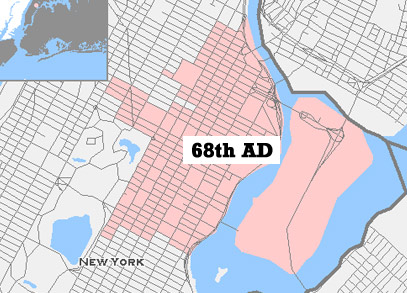
Assemblymember Adam Clayton Powell has represented the 68th District in East Harlem since he won the seat in the 2000 general election. He has also served on the City Council.
In recent years, Powell, who has reportedly considered running for city office, has had legal troubles. In March he was pulled over for drunk driving. He pleaded innocent to the charges on Oct. 17. In 2004, he faced rape allegations that were later dropped and managed to hold onto his seat.
Running against Powell is Republican Norma Soriano and, for the Independence Party, George L. Espada, who has been a wrestler and worked for the Board of Elections. Espada has previously run unsuccessfully for the Assembly and the City Council and initially tried to challenge Powell in the Democratic primary but was reportedly knocked off the ballot.
Little information is available about Soriano.
Powell raised no money in the period leading up to the filing of the 32 Day Pre-General report and had $12,775 on hand. Reports were not available for either of his opponents.
Manhattan Assembly District 67: A Former Nadler Aide vs. a Former Nadler Opponent
A Former Nadler Aide vs. a Former Nadler Opponent
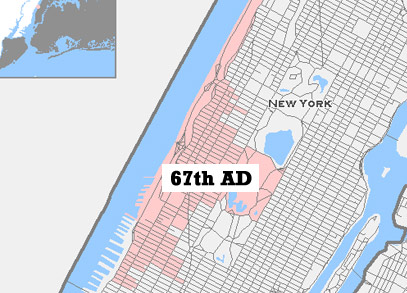
Democratic Assemblymember Linda Rosenthal was elected less than one full term ago in a special election in March 2006. Before Rosenthal was elected to represent this district on Manhattan's West Side, she was an assistant to U.S. Rep. Jerrold Nadler.
Rosenthal's Republican challenger is Eleanor Friedman. In 2006, Friedman ran against Nadler for U.S. House of Representatives. Little other information is available about her.
In the period leading up to the 32 Day Pre-General campaign finance filing, Rosenthal collected $21,875, leaving her with a balance of $62,462. Friedman has not filed a report on her campaign funds.
Â
Manhattan Assembly District 65: New Incumbent Seeks a Full Term
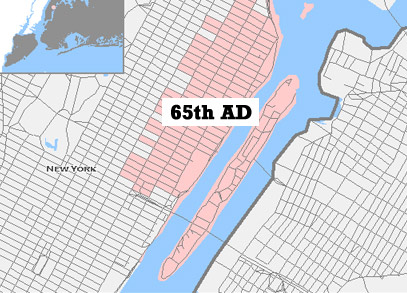
Assemblymember Micah Kellner was elected to the New York Assembly just over a year ago in a special election in June 2007. Kellner beat his Republican challenger with 64 percent of the vote. He is the first out bisexual member of the State Assemblymember.
Kellner's Republican challenger in this election is Georgiana Viest, an active member of the Republican Party who has been the manager of the Metropolitan Republican Club.
In his 32 Day Pre-General financial disclosure, Kellner reported having about $34,000 dollars in campaign funds. Viest has not filed any financial reports.
Â
Brooklyn Assembly District 41: Going for Three Decades in Office
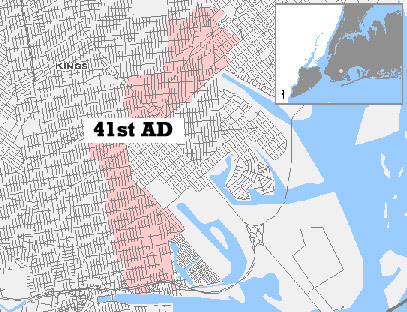
Democrat Helene Weinstein, who has served in the State Assembly since 1980, faces Republican/Conservative challenger Alan Bellone next week.
Weinstein chairs the Assembly's judiciary committee and considers families and children one of her major advocacy issues. She has authored a law to require seat belts on school buses.
Information on her opponent, Bellone, could not be found.
Weinstein's campaign has raised almost $34,000 in the period covered by the 32 DayPre-General report, and by the end of September had $288,650 on hand. Bellone reported no contributions for that filing period.
The 41st Assembly district includes Sheepshead Bay, Midwood, Flatlands, Canarsie and East Flatbush in Brooklyn.
Â
Brooklyn State Assembly District 46: Former Staffer Challenges an Incumbent
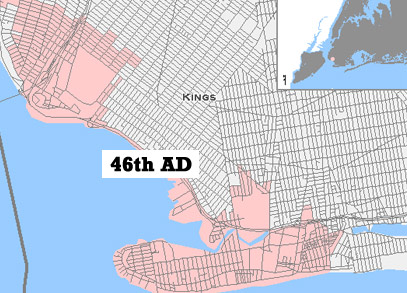
Incumbent Assemblymember Alec Brook-Krasny faces Republican challenger Robert Capano.
Brook-Krasny first ran for state Assembly in 2000, setting a record for write-in votes. A native of Moscow, he then ran unsuccessfully for City Council in 2005, and won his Assembly seat in 2006. He is the former executive director of the Council of Jewish Émigré Community Organizations.
The incumbent faces Republican Robert Capano, a former staffer for Brooklyn Borough President Marty Markowitz and Rep. Vito Fossella. He was also a high school teacher in Brooklyn.
According to the 32-Day Pre General filing, Brook-Krasny received $17,350 in contributions during that reporting period and ended September with $72,731. Capano collected $24,690 the most recent report period and, a month prior to the election, had $26,295 on hand.
The district includes Bay Ridge, Dyker Heights and Coney Island.
Â
Bronx Assembly District 76: A Frequent Candidate Tries Again
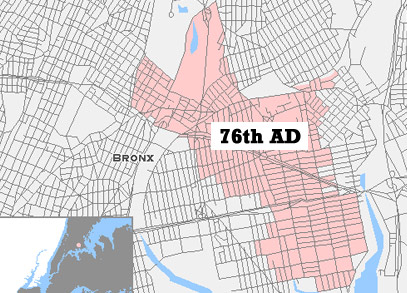
A former police officer, Peter Rivera has represented Parkchester and other neighborhoods in the eastern part of the borough since 1992. And for much of that time, he has been running against Charles Serrano, an exterminator once described as someone " who has made something of a second career out of challenging Democratic incumbents."
In 2000, for example, Serrano challenged Rivera in the Democratic primary. Serrano won with 52 percent of the vote. This time, Serrano is trying a different tact running on the Republican and Conservative lines.
According to the most recent report, Rivera had a campaign balance of about $58,000 at the end of September despite having taken in no contributions in the previous three months. Although Serrano had filed campaign reports for previous campaigns, a report for this year was not available.
Â







